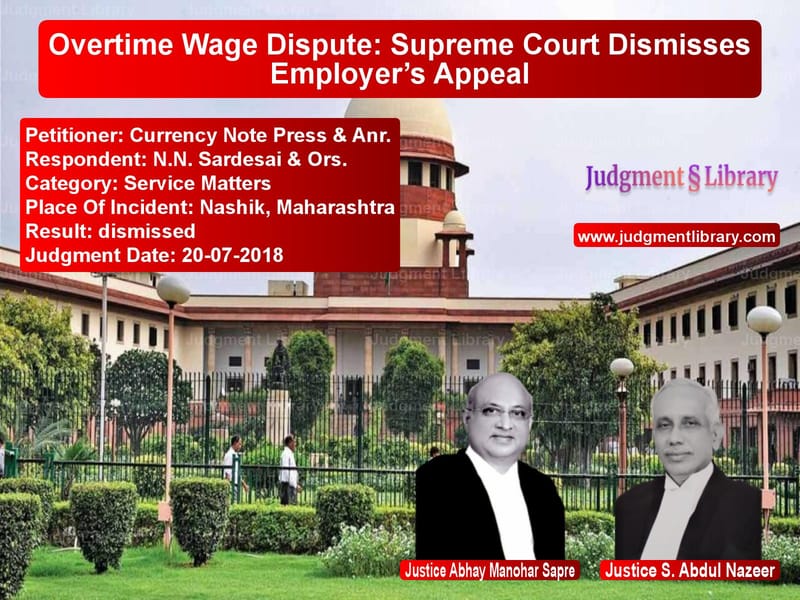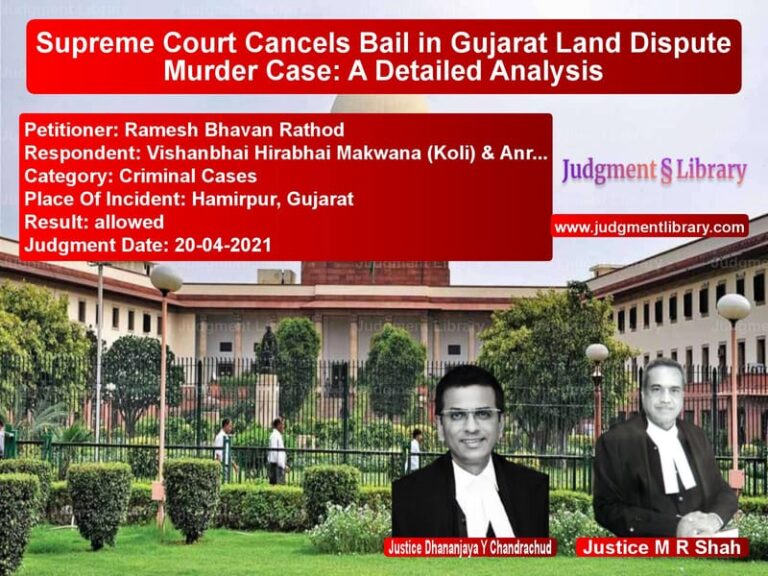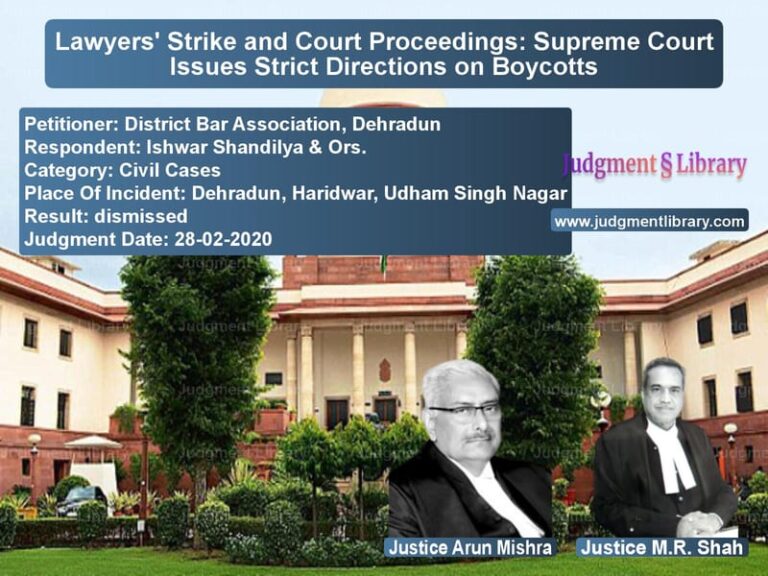Overtime Wage Dispute: Supreme Court Dismisses Employer’s Appeal
The Supreme Court of India recently adjudicated the case of Currency Note Press & Anr. vs. N.N. Sardesai & Ors., a significant ruling concerning labor law and overtime wage disputes. The case revolved around the claims of employees who sought additional compensation for overtime work, which had been dismissed by the Labor Court but later upheld by the Bombay High Court. The Supreme Court ultimately dismissed the employer’s appeal.
Background of the Case
The case was initiated by 17 employees working at the Currency Note Press, Nashik, a body corporate wholly owned by the Government of India. The employees, who held positions such as Junior Accounts Officers, Head Accountants, and Section Officers, filed applications under Section 33-C(2) of the Industrial Disputes Act, 1947, seeking overtime wages for work performed between 1986 and 1990.
The Labor Court dismissed the applications, leading the employees to challenge the decision before the Bombay High Court. The High Court overturned the Labor Court’s ruling and awarded the claimed overtime wages. The employer, dissatisfied with this outcome, approached the Supreme Court.
Legal Issues Raised
1. Entitlement to Overtime Wages
Were the employees entitled to overtime pay under the Industrial Disputes Act and relevant labor laws?
2. Jurisdiction of the High Court
Did the Bombay High Court err in interfering with the Labor Court’s findings?
3. Procedural and Legal Validity
Was the High Court correct in allowing the claims based on existing laws governing overtime pay?
Arguments by the Parties
Arguments by the Appellant (Currency Note Press & Anr.)
- The employees were not entitled to overtime pay under the relevant labor laws.
- The High Court overstepped its jurisdiction by overturning the Labor Court’s ruling.
- The monetary claims were made long after the alleged work period, making them untenable.
Arguments by the Respondents (N.N. Sardesai & Ors.)
- The employees had performed additional work beyond their designated hours and were entitled to compensation.
- The Labor Court’s decision was erroneous and did not consider all relevant labor laws.
- The High Court’s ruling correctly interpreted the law and protected employees’ rights.
Supreme Court’s Observations
1. No Grounds to Interfere with High Court’s Ruling
The Supreme Court ruled that there was no reason to overturn the Bombay High Court’s decision, stating:
“Having heard the learned counsel for the parties and on perusal of the record of the case, we are inclined to dismiss the appeal.”
2. Employees No Longer in Service
The Court noted that all 17 employees had either retired or passed away, making the dispute largely academic. It remarked:
“First, all the respondents (total 17) are now no longer in service and have either retired from service or died.”
3. Amounts Already Paid
The Court acknowledged that the payments had already been made in compliance with the High Court’s order:
“Fourth, the amount, pursuant to the impugned order, was already paid long back to the respondents.”
4. Legal Questions Left Open
The Court declined to address broader legal questions related to labor laws, leaving them open for future cases:
“We are not inclined to examine the legal questions urged by the learned counsel for the appellants and consider it proper to leave these questions open for our decision on their merits in some other case.”
Final Judgment
The Supreme Court dismissed the appeal, ruling:
- The High Court’s decision was upheld.
- The monetary relief awarded to the employees remained valid.
- No further legal questions would be addressed in this case.
Implications of the Judgment
This ruling has important implications for labor law and dispute resolution:
- Upholds Workers’ Rights: Reinforces employees’ right to claim overtime wages.
- Limits Appeals on Procedural Grounds: Dissuades employers from challenging High Court decisions without substantial grounds.
- Prevents Unnecessary Legal Delays: Encourages timely resolution of labor disputes.
- Clarifies Judicial Boundaries: Leaves broader legal questions open for future cases rather than deciding them in procedural appeals.
Conclusion
The case of Currency Note Press & Anr. vs. N.N. Sardesai & Ors. affirms the principle that employees are entitled to fair compensation for overtime work. The Supreme Court’s ruling underscores the importance of upholding labor rights while ensuring that disputes are resolved efficiently. By dismissing the employer’s appeal, the Court has reinforced the legal protections available to workers under India’s labor laws.
Petitioner Name: Currency Note Press & Anr..Respondent Name: N.N. Sardesai & Ors..Judgment By: Justice Abhay Manohar Sapre, Justice S. Abdul Nazeer.Place Of Incident: Nashik, Maharashtra.Judgment Date: 20-07-2018.
Don’t miss out on the full details! Download the complete judgment in PDF format below and gain valuable insights instantly!
Download Judgment: Currency Note Press vs N.N. Sardesai & Ors. Supreme Court of India Judgment Dated 20-07-2018.pdf
Direct Downlaod Judgment: Direct downlaod this Judgment
See all petitions in Employment Disputes
See all petitions in Public Sector Employees
See all petitions in Workplace Harassment
See all petitions in Judgment by Abhay Manohar Sapre
See all petitions in Judgment by S. Abdul Nazeer
See all petitions in dismissed
See all petitions in supreme court of India judgments July 2018
See all petitions in 2018 judgments
See all posts in Service Matters Category
See all allowed petitions in Service Matters Category
See all Dismissed petitions in Service Matters Category
See all partially allowed petitions in Service Matters Category







